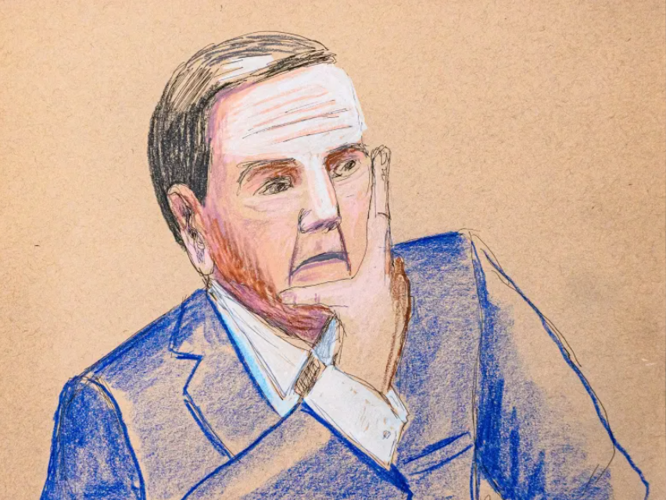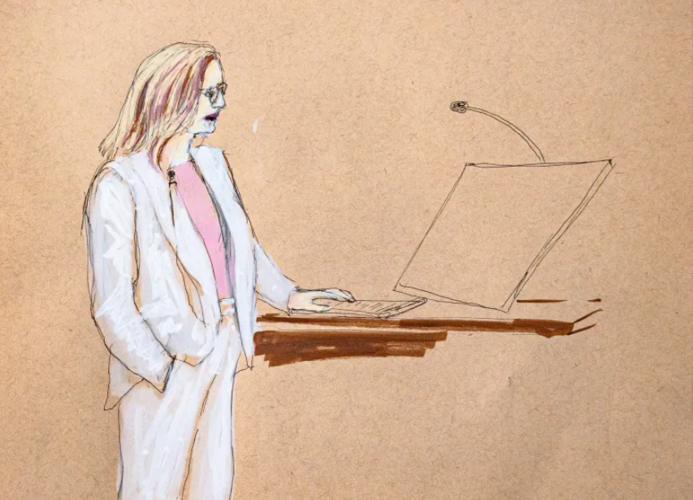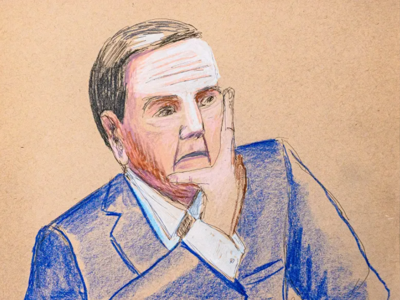This story is a partnership between the Nashville Banner and the Nashville Scene. The Nashville Banner is a nonprofit, nonpartisan news organization focused on civic news. Visit nashvillebanner.com for more information.
When Glen Casada’s attorney Ed Yarbrough approached the podium to give his closing argument, he gave the jury a very clear instruction.
“I don’t even want you to take notes," he said. "I just want to talk to you and invoke common sense.”
He didn’t present a PowerPoint like the prosecution or his colleague defending Cade Cothren had. He hardly spent any time looking down at his notepad. He didn’t even ask his paralegal to display evidence on the screen for the jury. He just talked.
“It’s not often that I get to stand in front of folks like you and question the fact that in a 19-count indictment, there may not even be a crime,” Yarbrough said.
For about 45 minutes — far less time than was used by the prosecution or by Cothren’s attorney Cynthia Sherwood, who went for nearly two-and-a-half hours — Yarbrough attempted to argue that there are holes in the prosecution's case that could not possibly lead to a conclusion of guilt beyond a reasonable doubt. He began with the question of when the state found out that Cothren was the person behind Phoenix Solutions, the company used to capture state funds through the postage and printing allowance of legislators.
“Isn’t it possible that Connie Ridley actually knew that Cade Cothren was behind Phoenix Solutions before any state money changed hands?” Yarbrough asked. “Does that create reasonable doubt in your minds?”
U.S. Attorney John Taddei was quick to point out during his rebuttal that Ridley had testified that she did not find out Cothren was behind Phoenix Solutions until May 2020, when she discovered his signature on the back of cashed checks. But that wasn’t the only piece of the prosecution's case in which Yarbrough attempted to poke holes.
“In politics, ladies and gentlemen, loyalties and prejudices move moment to moment,” Yarbrough said. He pointed out that Rep. Jay Reedy (R-Erin) had paid Casada $550 for campaign work in 2020, despite testifying that he would not have wanted to work with Casada or Cothren after the scandal that led to their resignations. Additionally, just as he did in opening arguments, Yarbrough argued that Speaker of the House Cameron Sexton was a political rival of Casada’s who worked with the FBI to take him down. “They’ve taken these payments and twisted them to fit a federal statute.”

Cynthia Sherwood during closing remarks, May 12, 2025
Yarbrough pointed out one of the glaring headlines of the trial: the fact that Sexton, who was anticipated as a star witness, was never called to the stand. Additionally, he pointed out that FBI Special Agent Brent Hayden, who led the investigation, never took the stand. But he didn’t stop there, as he attempted to question the credibility of former Rep. Robin Smith, Casada and Cothren’s alleged co-conspirator, who pleaded guilty and took the stand in the second week of the trial.
“If Robin Smith will lie to make a little bit of money, don't you know she’ll lie to avoid a 20-year sentence in federal prison,” Yarbrough said, also noting that Casada and Cothren both spoke with the FBI for two hours when their homes were raided, while Smith immediately called her attorney.
Throughout Yarbrough’s closing, the jury was visibly immersed, nodding along and clearly following his points. On the other hand, Sherwood’s marathon of a closing argument was a contrast of styles, as she stumbled over her words, constantly read straight from her binder, displayed a PowerPoint that largely seemed unneeded and took long pauses to flip through her notes.
“Many years ago, female authors used to use men's names because, for whatever reason, people wouldn’t buy women’s books,” Sherwood said in an attempt to argue that there was nothing wrong with Cothren using an alias to run Phoenix Solutions.
While Yarbrough chose a few key points to cast doubt, Sherwood attempted to weave her way through the entire case, recapping witness testimony and evidence. Her argument was loosely based on knocking over three metaphorical “dominoes” in the prosecution's case: whether or not Casada and Smith were agents of the state, whether or not there was bribery involved in the case, and whether or not there was any fraud.
Most of Sherwood’s argument boiled down to one key point: All of Phoenix Solutions' clients got the mailers they paid for.
“At its core, this case is about one thing: Did the state of Tennessee get exactly what it paid for?” Sherwood asked. “All of the evidence shows that it did.”
Sherwood ended her argument by holding up a Bible and a copy of the United States Code.
“You are not here to decide if Mr. Cothren violated a rule in this book,” she said, waiving the Bible at the jury. “You are here to decide if he violated the U.S. Code.”
U.S. Attorney Blake Ellison steered clear of the theatrics in his closing, instead going with a more straightforward approach. Step by step, he went through each of the 19 counts Casada and Cothren are charged with, and presented the jury with the evidence they had seen and heard from witnesses over the past few weeks.
“The defense said at the beginning of this trial that this is a simple case, and we agree,” Ellison said. “Mr. Cothren was a private businessman who paid two state legislators, Mr. Casada and Ms. Smith, to get state money, and all of them lied to conceal Cothren’s involvement.”
Closing arguments ended at 5:40 p.m. on Monday, so the jury will begin deliberations on Tuesday after Judge Eli Richardson gives them their instructions.
This article first appeared on Nashville Banner and is republished here under a Creative Commons Attribution-NoDerivatives 4.0 International License.







